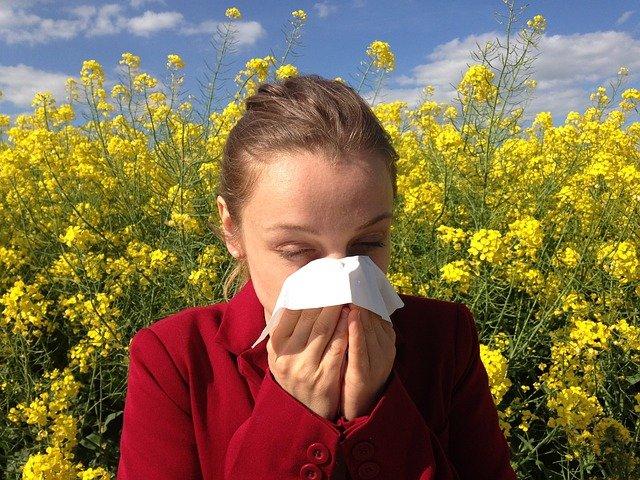An allergy is an acquired special sensitivity to a substance that is harmless to most people.
The victim tends to have repeated contact with the irritating substance which affects the skin or other body parts.
The substance that produces the allergic reaction is known as an allergen, a protein that the body interprets to be foreign and dangerous.
The adverse reaction that follows is called an allergic response.
Causes of Allergies
The underlying causes of allergy and sensitivity are dietary and lifestyle factors that break down one’s immune system and barrier defenses.
Specifically, imbalanced functions of the immune system, barrier function default, and toxic overload are in different degrees and they are responsible for the development, so also the continuation of allergy and its sensitivity.
Symptoms of Allergy
Allergies can affect the whole body and common symptoms or allergic response includes the following.
- Eyes-itching
- Redness/blood-shot
- Tears
- Dark circles
- Swelling Ears – itching
- Deafness
- Glue ear
Types of Allergies
Allergies can be categorized into environmental and food factors.
The typical allergic reactions people have to food, dust, pollen, and other substances are the body’s way of fending off the intrusion of toxins that disrupt the body’s equilibrium.
Environmental/Natural Allergies
Allergens usually enter the body through breathing, absorption through the skin, by eating or drinking foods, or by injection, such as insect bites or vaccinations.
Because the body interprets the substances to be dangerous to its health, the immune system identifies them as antigens.
The body’s immune system would now release certain antibodies to get rid of the allergenic antigens, setting up some complex series of activities involving many biochemicals.
These chemicals then produce the inflammation or other typical symptoms of an allergy response as they are listed above.
The most common cause of environmental allergies is the pollen of various plants such as trees, weeds, and grass.
House dust, mites, molds, and tobacco smoke are other causes.
Cosmetics, perfumes, household cleaning agents, the gas we use for cooking and heating, and fabrics.
Chemical sensitivity has been linked to the increasing prevalence of chemicals and toxins in our environment.
Pesticides in food, heavy metals in water, vehicle exhaust in the air, and numerous synthetic chemicals in personal hygiene products, cleaning supplies, and building materials.
Food/Substance Allergies
These are the abnormal or adverse responses to foods that other people eat with impurity.
Many people mistakenly or unknowingly take food intolerance for food allergy and they believe they’re allergic to some foods when they’re not.
A true food allergy involves the immune system causing the production of certain antibodies.
Foods most likely to trigger an allergic reaction are nuts, egg white, corn, wheat, milk and other dairy products, crayfish, chocolate as well as food dyes and additives.
Food intolerance does not, however, produce an immune response and symptoms may not occur immediately after eating a problem food which makes it difficult to diagnose.
Causes include – inherited sensitivity, foods with high histamine levels, enzyme deficiency, rogue proteins, and troublesome sugars.
Common Allergic responses
Sinuses – Blockage, infection, and pain
Nose – Sneezing, running, blockage/stuffy, itching, nosebleeds
Mouth – Swollen tongue, inflammation, or ulcers.
Others are congestion, wheeze, cough, the feeling of tightness in stomach, bowel-nausea, vomiting, bloating pain, itching bottom, aches, intestinal irritation skin-itching, redness, eczema, dermatitis and other rashes, swelling.
More so, allergic responses include headaches, puffy face, flushing of the cheeks, swelling, hives, and fatigue.
Allergies can be triggered by exposure to dust, pollens, molds, emotional stress, fabrics, dyes, feathers, animal dander, chemicals, foods, and a variety of other materials.
Diseases Associated with Allergies
The allergic reactions themselves can range from mild to severe depending on the individual.
Allergies can cause or contribute to the following illnesses.
- Asthma
- Bronchitis
- Rheumatoid arthritis
- Ear infection
- Diabetes
- Eczema
- Weight gain
- Heart palpitations
- Migraines
- Chronic fatigue
- Gastrointestinal disorders
- Kidney problems
- Seizures, among other conditions.
Conclusion
The body normally has an efficient system to fight off foreign substances such as bacteria or viruses.
The body produces antibodies to destroy or neutralize the effects of the invaders.
But the body of the allergic person seemingly overreacts to certain substances.
Antibodies are produced in great quantities, along with a product from the tissues called histamine.
During an allergic reaction, histamine escapes from the body cells, causing inflammation and irritation.
It can cause a flow of mucus in the lungs and nasal passages, which looks like one of the symptoms of a cold.
Thus, there is a need for the body to counteract the histamines (using antihistamines) in some allergies.
